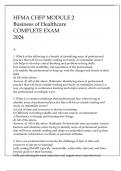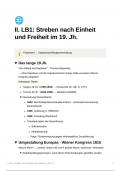Exam (elaborations)
HFMA CHFP MODULE 2 BUSINESS OF HEALTHCARE COMPLETE EXAM WITH ANSWERS & RATIONALES
- Course
- BSN
- Institution
- University Of Minnesota - Duluth
HFMA CHFP MODULE 2 BUSINESS OF HEALTHCARE COMPLETE EXAM WITH ANSWERS & RATIONALES
[Show more]




